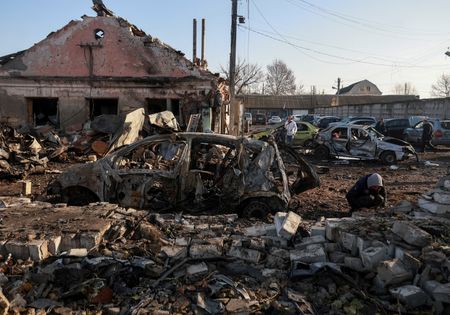By Ahmad Ghaddar, Shariq Khan and Robert Harvey
LONDON/NEW YORK (Reuters) -U.S. sanctions are dismantling what remains of Lukoil’s Litasco, once Russia’s biggest oil trader and a rival to top Swiss houses and oil majors, five sources told Reuters.
The measures, which also target state-owned Rosneft, took effect on Friday as Washington seeks to choke off Moscow’s ability to fund its war in Ukraine. They have thrown Lukoil’s global operations into limbo, from oilfields in the Middle East to fuel pumps and refineries across Europe.
Cut off from the global financial system, Litasco has dismissed most traders and operational staff, offering about three months’ severance and bonuses, the sources said.
Oil trading requires billions of dollars in credit, now out of reach. A handful of employees will remain to handle administrative tasks.
Litasco and Lukoil did not immediately reply to a Reuters request for comment.
LITASCO SHUTS DOWN GLOBAL OFFICES
Crude oil traders and other staff are set to depart Litasco’s Swiss headquarters in Geneva by the end of this week, according to three sources. The office is expected to be fully shut by the end of February, a fourth source said.
In the U.S. offices in Houston, most of the firm’s 20-odd traders and operational personnel departed on Thursday, two sources said. A few employees will stay on to unwind remaining commitments with suppliers and customers, they said.
In the UAE offices in Dubai, employees have been served notice but will be employed until February, one source said.
Founded in 2000, Litasco was among the top global oil trading firms in its heyday, moving oil and fuels for Lukoil’s assets around the world as well as trading third-party barrels.
SHADOW FLEET MAY BECOME LIFELINE
Litasco traded just under 4 million barrels per day (bpd) of crude and fuel in 2019, or about 4% of global consumption at the time.
It competed with oil majors and trading houses alike, poaching some of their top talent.
Litasco’s winding down will drive Russian oil trading further underground, said Adi Imsirovic from consultancy Surrey Clean Energy, and former head of oil trading at Gazprom trading.
Moscow relies heavily on a shadow fleet of aging tankers to ship crude despite sanctions.
“It is possible to bounce back, but it requires money, time and patience,” Imsirovic said.
Russia had to reroute most of its oil exports to Asia from Europe due to U.S. and EU sanctions.
Litasco took a big hit in 2022 when the West clamped down on Russia’s oil industry over Moscow’s invasion of Ukraine but it tried to rebuild operations in recent years hiring U.S. traders and securing credit lines.
“Litasco obviously has to close given the sanctions. Russian oil will get to refiners one way or another but traders need access to dollars and the global financial system,” said energy economist Philip Verleger.
(Editing by Dmitry Zhdannikov and Louise Heavens)










